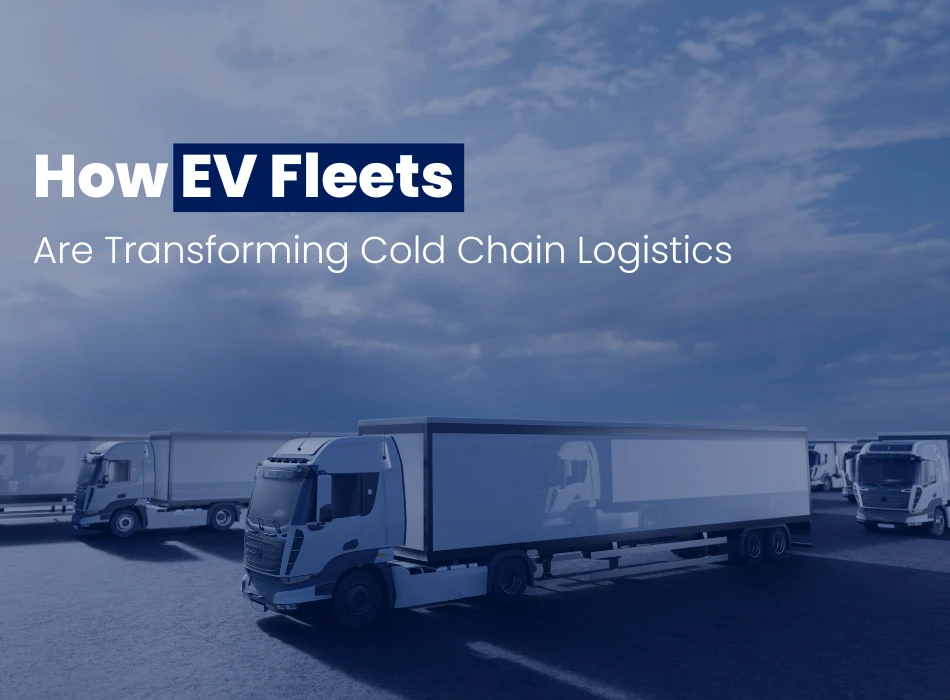How EV Fleets Are Transforming Cold Chain Logistics
Discover how electric vehicle fleets are transforming cold chain logistics by enhancing sustainability, efficiency, and product quality maintenance through advanced refrigeration systems and IoT integration.

The integration of electric vehicle (EV) fleets into cold chain logistics is revolutionizing the way temperature-sensitive products are transported. As concerns about sustainability and efficiency escalate, the adoption of EVs in cold chain operations is becoming increasingly important. This blog will delve into the transformative effects of EV fleets on cold chain logistics, discussing key innovations, benefits, and challenges.
Key Innovations in EV Fleets for Cold Chain Logistics
Advanced Refrigeration Systems
- Energy Efficiency: EVs are equipped with state-of-the-art refrigeration systems that ensure precise temperature control. These systems leverage advanced insulation techniques and eco-friendly refrigerants to maintain optimal temperatures during transit.
- Compact Design: Compact designs allow for seamless integration into smaller vehicles, making them ideal for last-mile deliveries. This minimizes logistical disruptions and optimizes delivery routes.
Battery Life Extension
- High-Performance Batteries: Some EVs come equipped with high-performance batteries that extend operating times. For instance, Vaara’s refrigerated containers can operate for over 5 hours on a single charge, eliminating the need for frequent recharges during deliveries.
- Backup Power Modes: Innovative backup power modes ensure continued operation even during vehicle failures or prolonged idling periods. This feature minimizes potential product spoilage and maintains continuity in delivery operations.
IoT Integration and Remote Monitoring
- Real-Time Alerts: Indigenized IoT integration with sensors provides real-time alerts and monitoring, ensuring prompt actions if temperature conditions deviate from acceptable ranges. GPS tracking facilitates fleet management, optimizing operations and reducing manual interventions.
- Cloud-Based Platforms: Cloud-based platforms enable real-time remote temperature monitoring and location tracking. This ensures constant visibility throughout the delivery process, aiding in predictive risk assessment and optimized logistics.
Benefits of EV Fleets in Cold Chain Operations
- Environmental Sustainability:
- Zero-tailpipe emissions significantly reduce carbon footprints, aligning with global sustainability initiatives and regulatory requirements. This makes EVs an attractive option for companies seeking to minimize their ecological impact.
- Operational Efficiency:
- Lower operational costs result from reduced maintenance needs and lower fuel costs associated with electricity usage. This translates into cost-efficient logistics operations that enhance profitability margins.
- Product Quality Maintenance:
- Precise temperature control ensures that products remain within specified ranges, thereby maintaining their quality and safety until they reach end-users. This reduces spoilage rates and improves overall product integrity.
Challenges and Opportunities
- Charging Infrastructure:
- Limited access to charging stations remains a challenge despite ongoing infrastructural developments. Continuous investments in expanding charging networks are essential for widespread adoption.
- Vehicle Selection:
- Finding EV models that perfectly match unique operational requirements can be difficult. Ongoing research and development aim to bridge this gap by creating versatile EV models suitable for intensive logistics use.
- Partnerships and Collaborations:
- Successful implementation requires collaboration among logistics companies, EV manufacturers, and technology providers. Partnerships facilitate the sharing of knowledge and resources needed to overcome technical hurdles and achieve sustainable outcomes.
Conclusion
The integration of EV fleets into cold chain logistics represents a pivotal moment in the industry’s quest for sustainability and efficiency. By harnessing advanced refrigeration systems, extending battery life, incorporating IoT technologies, and fostering collaborations among stakeholders, companies can significantly enhance their ability to maintain product quality while reducing environmental impacts. As the demand for eco-friendly delivery options continues to rise, transitioning to EV fleets positions businesses ahead in terms of regulatory compliance and customer satisfaction. The future holds promise with ongoing innovations aimed at overcoming existing challenges and unlocking new opportunities in cold chain logistics.